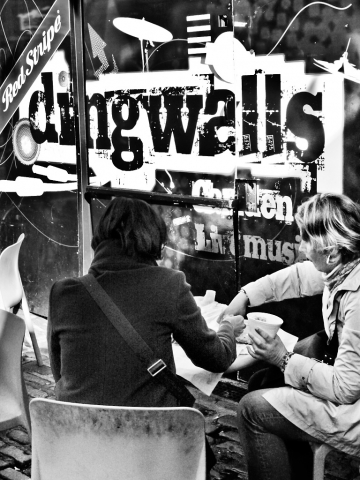It was the summer of 1983. I was seventeen years old. One of those youths who loved music and yearned – like so many others – to be part of something that would be “mine”. I had seen reviews of their first single, and was aware of the beginnings of a “buzz” about this band, but I didn’t take too much notice. Until I found myself travelling down to London to stay at my big sister’s flat. Now, her flatmates were, in the eyes of a seventeen-year-old – and for want of a better word – cool. They seemed to know everyone. In conversation, the names of singers and musicians – all regulars from the pages of the NME – who’d been round the flat for a cup of tea kept popping up. I was mightily impressed.
One night they took me out. Up to Camden: couple of beers, round to visit some bloke from Scritti Politti at his squat, then to Dingwalls to see The Smiths. Walking there, I was amazed to hear the words “Oh – didn’t I mention it? We’re on the guest list.” It was getting better by the minute. I could just see myself back at school telling all this to the handful of people who would actually be impressed.
Camden by night was all new to me. I’d been to the market before, but never been to Dingwalls. The place was legendary. Everyone had played there. Each week, I’d see the club’s distinctive logo of a sunglasses-wearing crow on the adverts printed in the NME, look at the gig list, and think about how much I needed to go there.
Stepping off the main road into the stables area was like stepping onto the set of a black and white film. A place haunted by the voices of every bargee who ever plied his trade on the Regent’s Canal. Long low buildings, archways, fly-posters on dirty brick walls, cobblestones, warehouses and walkways, scruffy people sitting around, can-in-hand: this was Camden before big business moved in. The old painted Dingwalls logo on the wall. Fading paint from an earlier age. A post-industrial landscape – everything I love. The sort of place that looks its best in the rain.
The let-down began at the door: they were on the guest list – I wasn’t. Then, stepping inside, the club wasn’t what I expected. Low ceiling? Yes. Bar? Yes. Crowded? Yes again. Loud, dark and sweaty? Abso-bloody-lutely. Fruit Machine? A Fruit machine! I’m here to see the country’s hottest new indie band and there’s a fruit machine. Surely that’s the antithesis of the geeky indie-boy aesthetic? And, hang on, that’s Lemmy playing on it! I was expecting grey raincoats, not cowboy hats and boots.
My next shock was the bar prices. How much for a pint? Out of my price range, I’m afraid. In those days before easily available overdrafts and endless bank machines, hard cash was everything. You couldn’t just pass a card to the barman. Spend it all in the bar and you’d be walking home. No more beer for me tonight.
Then I realise there’s another problem. We’ve turned up late. It’s crowded. It’s a warm summer’s day. Can I be bothered to push my way through the crowd to reach the front? And there are pillars everywhere: not so much holding the ceiling up as dragging it down. And the damn things get in the way and block your view. Hang on a moment, there are video screens: I’ll watch the gig on them.
So, ten yards away are the future of British pop music, working hard to impress the London audience. And all I can see is a scratchy black and white image – at least, it’s black and white in my memory – of four blokes crowded onto the stage. I can’t remember one song. If Morrissey was waving flowers around, I didn’t see it. Hearing aid? National Health Glasses? No memory of those whatsoever. Deliciously jangling guitar chords? A solid rhythm section? Not where I was standing. More like a wall of sound – and not in a good way.
I’ve read reviews that talk of a rapturous crowd, stage invasions and two encores. I suppose I missed that as well. I wasn’t overly impressed. The most memorable thing about that night was getting locked in Elephant and Castle tube station and having to be let out by the cleaners.
A few weeks later, This Charming Man came out to rapturous reviews, and I bought it. It was wonderful, they were far better than I remembered them sounding. That said, however brilliant it was, it was the first and last Smiths record I ever purchased. I’d had my “moment” and then the bubble had burst. As everyone else started to get into them, I got out. It was probably a case of being deliberately and wilfully elitist. Cutting off my nose to spite my face – and cutting myself off from some of the greatest pop music of my generation.
I never saw The Smiths again but, in the months and years that followed, whenever someone mentioned them, I could always say, “Yeah, saw them at Dingwalls in ’83. Before they were famous.”
It was almost true.
P.S. Did I ever tell you about the time I couldn’t be bothered to go to see New Order in the week they released their first single?…


